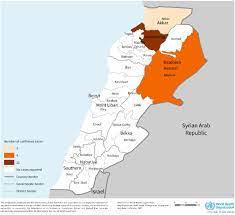
On 6 October 2022, Ministry of Public Health (MOPH) announced the first cholera case in the North of Lebanon.
By 24 October, the Cholera has spread further to Mount Lebanon and East Lebanon mainly in Arsal, Baalbak and Central Bekaa Governorate with more than 913 confirmed cases and 14 deaths across the country.
Children under-14 make up over 50% of all cases and children between aged between 0-4 years make up over a third, showing their unique vulnerability. Health professionals estimates that the number cases with symptoms are usually 3 times what is reported by MOPH due to limited testing. Lebanon is likely to witness a further surge in cholera spread due to weak water and sanitation infrastructures. In just 14 days the total number of confirmed cases originally in 5 localities in the North, spread to 45 localities across all of Lebanon.
The current compounded crises in Lebanon have affected the living conditions of all populations, disrupting health, water and sanitation services, systems scarcity, and unaffordability of water, triggering reliance on water sources of unknown safety, and finally funding shortfalls to provide needed humanitarian assistance, particularly in vulnerable settings.
The cases are dispersed in 11 cadastre/casas out of total 26 in Lebanon. Save the Children projects the total cases impacted by Cholera in Lebanon will surpass 300,000 cases with the current attack rate of Vibrio Cholerea O1 El-Tor Ogawa strain (V. cholerae); while 80% of the cases estimated to be asymptomatic and 20% showing symptoms. The current case fatality rate is currently at 2%, which is high compared to the standard set by WHO to be below 1%. In parallel, sewage water testing conducted by WHO in Ain Mraisseh in Beirut, Ghadir station in Mount Lebanon, and Bourj Hammoud also in Mount Lebanon, confirmed the presence of V. cholerae in all three sources. This means that cholera is present in high-populated urban settings and the projection for further fast spread is anticipated.
Preliminary indicators reflect an extremely poor WASH environment, risking a rapid spread of the disease if early action is not taken immediately (from Save the Children data):
• 91.1 % of existing boreholes are bacteriologically contaminated in the Beqaa area
• 78.4 % of our conducted water tests in ITSs are showing water contamination
• 93.8 % of water tests from entities connected to public water are showing contamination
• A significant number of households in informal tented settlements don’t have access to proper water and latrine solutions
Among 85 water analyses in public schools conducted by Save the Children in the last two weeks, 56.5% yielded unsatisfactory results with high prevalence of coliforms existing in the bacteriological test, while 43.5% yielded satisfactory results. Those schools whose water source is a public network, 75% were unsatisfactory while 25% were satisfactory; while the water sources from boreholes showed 87.5% unsatisfactory and 12.5% were satisfactory.
Save the Children has been responding with partners in three areas of implementation in East, North and Central Lebanon, as one of the largest WASH partners in Lebanon. The response includes delivering lifesaving water, hygiene, health and sanitation supplies and services to affected areas and helping families and children improve their hygiene practices. To date, we have:
o Trained over 600 frontline workers, teachers and partners on cholera awareness, including transmission, symptoms, treatment, prevention and referral mechanisms.
o Distributed 5,000 Information, Education and Communications (IEC) materials to schools and community centers.
o Delivered a remote Cholera Awareness campaign through teachers to over 10,000 caregivers and children.
o Collected and tested water bacteriological in 147 public schools and 28 community center of local partners.
o Distributed over 900 dioxide chlorine tabs in public schools and community centers, improving water quality for 6,724 children.
o Referred 20 suspected cases of acute watery diarrhoea (AWD) to health partners.
o Procured 100,000 Dioxide Chlorine tabs treat contaminated water in Schools and Community centers.
o Distributed 24 Oral Rehydration Salts (ORS) and 82 Cholera Treatment Kits to support the treatment of cholera cases in Central and West Bekaa.
o Scaled up safe water deliveries and increased desludging to over 37,846 people living in informal settlements including 21,769 children in Central and West Bekaa.
o Raised the alarm of cholera in Lebanon and in the region, raising the voices of community members and front-line staff.
Save the Children’s response will continue to scale up, ensuring children in schools and communities are protected from possible water related outbreaks, have access to safe water, sanitation and hygiene and their wellbeing is maintained. This includes awareness messaging, health hygiene promotion in schools and distribution of soap, hygiene kits and chlorination tablets for supported communities, as well as providing support for sustainable solutions such as UV solar-powered systems for cleaning water.
Source: Relief Web
https://reliefweb.int/report/lebanon/save-children-response-cholera-crisis-lebanon-october-27th-2022
 FR
FR EN
EN AR
AR








